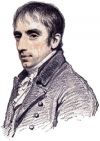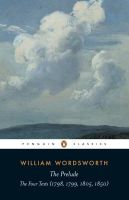|
![Samuel Colman 1832 - 1920 [click for larger]](sitebuildercontent/sitebuilderpictures/.pond/tinternabbey.jpg.w300h221.jpg)
|
| Tintern Abbey with Elegant Figures |
Five years have past; five summers, with the length
Of five long winters! and again I hear
These waters, rolling
from their mountain-springs
With a soft inland murmur. Once again
Do I behold these steep and lofty cliffs,
That
on a wild secluded scene impress
Thoughts of more deep seclusion; and connect
The landscape with the quiet of the sky.
The
day is come when I again repose
Here, under this dark sycamore, and view
These plots of cottage ground, these orchard
tufts,
Which at this season, with their unripe fruits,
Are clad in one green hue, and lose themselves
'Mid groves
and copses. Once again I see
These hedgerows, hardly hedgerows, little lines
Of sportive wood run wild; these pastoral
farms,
Green to the very door; and wreaths of smoke
Sent up, in silence, from among the trees!
With some uncertain
notice, as might seem
Of vagrant dwellers in the houseless woods,
Or of some Hermit's cave, where by his fire
The
Hermit sits alone.
These beauteous forms,
Through a long absence, have not been to me
As is a landscape to a
blind man's eye;
But oft, in lonely rooms, and 'mid the din
Of towns and cities, I have owed to them,
In hours of
weariness, sensations sweet,
Felt in the blood, and felt along the heart;
And passing even into my purer mind,
With
tranquil restoration: -feelings too
Of unremembered pleasure; such, perhaps,
As have no slight or trivial influence
On
that best portion of a good man's life,
His little, nameless, unremembered, acts
Of kindness and of love. Nor less,
I trust,
To them I may have owed another gift,
Of aspect more sublime; that blessed mood,
In which the burthen of
the mystery,
In which the heavy and the weary weight
Of all this unintelligible world,
Is lightened: -that serene
and blessed mood,
In which the affections gently lead us on -
Until, the breath of this corporeal frame
And even
the motion of our human blood
Almost suspended, we are laid asleep
In body, and become a living soul;
While with
an eye made quiet by the power
Of harmony, and the deep power of joy,
We see into the life of things.
If this
Be
but a vain belief, yet, oh! how oft -
In darkness and amid the many shapes
Of joyless daylight; when the fretful stir
Unprofitable,
and the fever of the world,
Have hung upon the beatings of my heart -
How oft, in spirit, have I turned to thee,
O
sylvan Wye! thou wanderer through the woods,
How often has my spirit turned to thee!
And now, with gleams of half-extinguished
though
With many recognitions dim and faint,
And somewhat of a sad perplexity,
The picture of the mind revives again:
While
here I stand, not only with the sense
Of present pleasure, but with pleasing thoughts
That in this moment there is life
and food
For future years. And so I dare to hope,
Though changed, no doubt, from what I was when first
I came among
these hills; when like a roe
I bounded o'er the mountains, by the sides
Of the deep rivers, and the lonely streams,
Wherever
nature led -more like a man
Flying from something that he dreads than one
Who sought the thing he loved. For nature
then
(The coarser pleasures of my boyish days,
And their glad animal movements all gone by)
To me was all in all.
-I cannot paint
What then I was. The sounding cataract
Haunted me like a passion; the tall rock,
The mountain, and
the deep and gloomy wood,
Their colours and their forms, were then to me
An appetite; a feeling and a love,
That
had no need of a remoter charm,
By thought supplied, nor any interest
Unborrowed from the eye. -That time is past,
And
all its aching joys are now no more,
And all its dizzy raptures. Not for this
Faint I, nor mourn nor murmur; other gifts
Have
followed; for such loss, I would believe,
Abundant recompense. For I have learned
To look on nature, not as in the hour
Of
thoughtless youth; but hearing oftentimes
The still, sad music of humanity,
Nor harsh nor grating, though of ample power
To
chasten and subdue. And I have felt
A presence that disturbs me with the joy
Of elevated thoughts; a sense sublime
Of
something far more deeply interfused,
Whose dwelling is the light of setting suns,
And the round ocean and the living
air,
And the blue sky, and in the mind of man:
A motion and a spirit, that impels
All thinking things, all objects
of all thought,
And rolls through all things. Therefore am I still
A lover of the meadows and the woods,
And mountains;
and of all that we behold
From this green earth; of all the mighty world
Of eye, and ear -both what they half create,
And
what perceive; well pleased to recognise
In nature and the language of the sense
The anchor of my purest thoughts, the
nurse,
The guide, the guardian of my heart, and soul
Of all my moral being.
Nor perchance,
If I were not thus
taught, should I the more
Suffer my genial spirits to decay:
For thou art with me here upon the banks
Of this fair
river; thou my dearest Friend,
My dear, dear Friend; and in thy voice I catch
The language of my former heart, and read
My
former pleasures in the shooting lights
Of thy wild eyes. Oh! yet a little while
May I behold in thee what I was once,
My
dear, dear Sister! and this prayer I make,
Knowing that Nature never did betray
The heart that loved her; 'tis her privilege,
Through
all the years of this our life, to lead
From joy to joy: for she can so inform
The mind that is within us, so impress
With
quietness and beauty, and so feed
With lofty thoughts, that neither evil tongues,
Rash judgments, nor the sneers of
selfish men,
Nor greetings where no kindness is, nor all
The dreary intercourse of daily life,
Shall e'er prevail
against us, or disturb
Our cheerful faith, that all which we behold
Is full of blessings. Therefore let the moon
Shine
on thee in thy solitary walk;
And let the misty mountain winds be free
To blow against thee; and, in after years,
When
these wild ecstasies shall be matured
Into a sober pleasure; when thy mind
Shall be a mansion for all lovely forms,
Thy
memory be as a dwelling place
For all sweet sounds and harmonies; oh! then,
If solitude, or fear, or pain, or grief,
Should
be thy portion, with what healing thoughts
Of tender joy wilt thou remember me,
And these my exhortations! Nor, perchance
-
If I should be where I no more can hear
Thy voice, nor catch from thy wild eyes these gleams
Of past existence
-wilt thou then forget
That on the banks of this delightful stream
We stood together; and that I, so long
A worshipper
of Nature, hither came
Unwearied in that service; rather say
With warmer love -oh! with far deeper zeal
Of holier
love. Nor wilt thou then forget,
That after many wanderings, many years
Of absence, these steep woods and lofty cliffs,
And
this green pastoral landscape, were to me
More dear, both for themselves and for thy sake!
![Tintern Abbey [click for larger image]](sitebuildercontent/sitebuilderpictures/.pond/tinternabbey1.jpg.w300h243.jpg)
|
| The interior of Tintern Abbey, photographed by Roger Fenton between 1851 and 1862 |
|
 |
|
 |
 |
|

|
| William Wordsworth 1770-1850 |
Wordsworth loved and drew
inspiration from this landscape
of the Lake District, his home.
Today we hope that the
importance of place has
been retained: that interacting
with Wordsworth’s work, in
the place it was created,
allows the freshness of the
original inspiration to live.
a biography and
associated links.
from the
visit Cumbria website
William Wordsworth's birthplace
in Cockermouth, Cumbria
is now administered by
The National Trust

|
| First published in July 1850 |
|
|
related internet links
|
|
the birthplace of Wordsorth
and his sister Dorothy.
at the visitcumbria website
a unique site combining
stunning Lake District
photography with a
definitive guide to this
most beautiful area
of England
peaceful and picturesque
landscapes surround this
tranquil lake, including
Rydal Mount, where
Wordsworth lived, from
1813 till his death in 1850
along whose banks
the footsteps of Wordsworth
trod, from the Welsh mountains
to the sea. this from Wikipedia
the Cistercian abbey of Tintern
is one of the greatest monastic
ruins of Wales. it was only the
second Cistercian foundation in
Britain, and the first in Wales, and
was founded on 9 May 1131
by Walter de Clare, lord of Chepstow.
the inspiration for the poem.
memories, views, council meetings,
a philosophy circle, Tintern News,
and some very lovely photographs.
|
|
 |
 |
|
 |
|
|
 |
|
|
|

